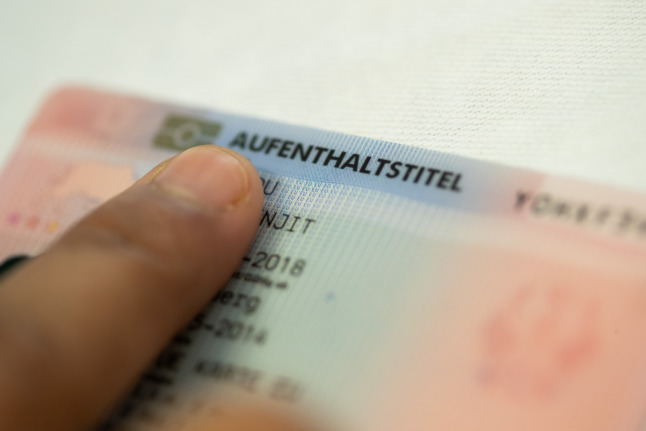How long can you leave Germany for without losing permanent residency?

The amount of time someone with a permanent residency card can leave Germany without jeopardising their right to stay depends on their individual circumstances. We break down what you need to know.
There's only one residency card that allows a person to be away from Germany for as long as they want and still return without any issues - having a German passport.
Every other type of permit comes with a time limit - or other restrictions - on the right to remain in the Bundesrepublik. A permanent residency card (or Niederlassungserlaubnis) is no exception.
READ ALSO:
- EXPLAINED: How German citizenship differs from permanent residence
- Lack of transparency: What it's like to apply for permanent residence in Germany
General rule of six months
In general, a permanent residency permit (sometimes also called an unbefristete Aufenthaltserlaubnis, or unlimited residence permit) expires six months after a person leaves the country.
However, the holder of permanent residency can apply to stay abroad for longer without giving up their unbefristete status in cases such as caring for a sick family member abroad or studying for a semester or two at a foreign university.
It's important to note that the latter exception only applies for Gastsemester (or exchange semesters), and not doing your entire course of study for a degree at a university abroad.
Permit holders can also petition to extend their stay abroad when it "serves in the interests of Germany," according to Germany's Immigration Authorities (Landesamt für Einwanderung).
One example of this could be working for a corperation which is headquartered in Germany.

A German residence permit or 'Aufenthaltstitel'. Photo: picture alliance/dpa | Daniel Karmann
Who is automatically exempt from the six month rule?
There's no limit of time a permanent residency holder can remain abroad if they're married to - or a registered partner with - a German citizen, a Berlin-based immigration law firm told The Local.
This also applies for those who have a child - or children - under the age of 18 in Germany.
There's also no time limit if a person has resided in Germany for a minimum of 15 years and can prove upon their return that they have a gesicherter Lebensunterhalt, or secured livelihood. This also applies to a spouse with a permanent residency card.
To avoid any issues at the border control, there's still a special Bescheinigung über ein unbefristetes Aufenthaltsrecht (Certificate about a permanent stay) these groups will need to apply for to present to Border Control.
EU permanent residency holders
For those who have lived in Germany for at least five years it's possible to receive an EU permanent residency card, or EU-Daueraufenthalt. Unlike with a Niederlassungserlaubnis, it entitles holders to live and work throughout the EU.
Holders are able to stay outside of the EU for up to six months without losing the card, and up to 12 months if they previously held a Blue Card.
For people who had the permit issued in Germany, it expires six years after a stay outside of the Bundesrepublik in another EU country or when they receive an EU-permanent residency card from another EU country.
The conditions for when the card never expires are more or less the same as with the Niederlassungserlaubnis.
That means that those who are married to - or in a registered partnership with - a German, or have lived in the country for at least 15 years and have sufficient funds, shouldn't have much reason for worry.
But they, too, will need to fill out a special form and other paperwork when re-entering Germany.
Blue Card holders
Many holders of an EU Blue Card are on the path to getting a Niederlassungserlaubnis. They are able apply for permanent residency after only three years of living in the Bundesrepublik.
However, they may lose their Blue Card status after 12 months of living outside of Germany.
However, holders of the Blue Card can apply to remain abroad for longer when their stay is in the interest of Germany, for example working for an international company headquartered in Frankfurt.
READ ALSO: What happens to your EU Blue Card if you lose your job in Germany?
Brits with an Aufenthaltsdokument-GB
British citizens who were covered by the post-Brexit Withdrawal Agreement are allowed to live and work in Germany for an unlimited amount of time - just like EU citizens and people with a permanent residency permit.
However, if you are in this situation, there are two different types of residence documents you may have been issued - and each has its own rules when it comes to spending time outside of Germany.
If you had lived in Germany for less than five years at the time when your residence document was issued, you'll most likely be covered by very similar rules to that of an ordinary permanent residence permit. That means you can spend up to six months outside of the country without losing your rights, or twelve in exceptional circumstances.
However, if you had been here longer than five years when your card was issued, you would have been entitled to 'Daueraufenthalt' (long-term residence) rights. This means that you'll not only be able to live and work in Germany for an unlimited time, but you'll also have the right to spend up to five years abroad without losing your residence status.
READ ALSO: Reader question: Is my British residency title the same as permanent residency in Germany?
This article is intended to serve as a guideline, and not provide concrete legal advice. We recommend contacting a legal service if you have specific concerns about obtaining, keeping or losing permanent residency status.
Comments (1)
See Also
There's only one residency card that allows a person to be away from Germany for as long as they want and still return without any issues - having a German passport.
Every other type of permit comes with a time limit - or other restrictions - on the right to remain in the Bundesrepublik. A permanent residency card (or Niederlassungserlaubnis) is no exception.
READ ALSO:
- EXPLAINED: How German citizenship differs from permanent residence
- Lack of transparency: What it's like to apply for permanent residence in Germany
General rule of six months
In general, a permanent residency permit (sometimes also called an unbefristete Aufenthaltserlaubnis, or unlimited residence permit) expires six months after a person leaves the country.
However, the holder of permanent residency can apply to stay abroad for longer without giving up their unbefristete status in cases such as caring for a sick family member abroad or studying for a semester or two at a foreign university.
It's important to note that the latter exception only applies for Gastsemester (or exchange semesters), and not doing your entire course of study for a degree at a university abroad.
Permit holders can also petition to extend their stay abroad when it "serves in the interests of Germany," according to Germany's Immigration Authorities (Landesamt für Einwanderung).
One example of this could be working for a corperation which is headquartered in Germany.

Who is automatically exempt from the six month rule?
There's no limit of time a permanent residency holder can remain abroad if they're married to - or a registered partner with - a German citizen, a Berlin-based immigration law firm told The Local.
This also applies for those who have a child - or children - under the age of 18 in Germany.
There's also no time limit if a person has resided in Germany for a minimum of 15 years and can prove upon their return that they have a gesicherter Lebensunterhalt, or secured livelihood. This also applies to a spouse with a permanent residency card.
To avoid any issues at the border control, there's still a special Bescheinigung über ein unbefristetes Aufenthaltsrecht (Certificate about a permanent stay) these groups will need to apply for to present to Border Control.
EU permanent residency holders
For those who have lived in Germany for at least five years it's possible to receive an EU permanent residency card, or EU-Daueraufenthalt. Unlike with a Niederlassungserlaubnis, it entitles holders to live and work throughout the EU.
Holders are able to stay outside of the EU for up to six months without losing the card, and up to 12 months if they previously held a Blue Card.
For people who had the permit issued in Germany, it expires six years after a stay outside of the Bundesrepublik in another EU country or when they receive an EU-permanent residency card from another EU country.
The conditions for when the card never expires are more or less the same as with the Niederlassungserlaubnis.
That means that those who are married to - or in a registered partnership with - a German, or have lived in the country for at least 15 years and have sufficient funds, shouldn't have much reason for worry.
But they, too, will need to fill out a special form and other paperwork when re-entering Germany.
Blue Card holders
Many holders of an EU Blue Card are on the path to getting a Niederlassungserlaubnis. They are able apply for permanent residency after only three years of living in the Bundesrepublik.
However, they may lose their Blue Card status after 12 months of living outside of Germany.
However, holders of the Blue Card can apply to remain abroad for longer when their stay is in the interest of Germany, for example working for an international company headquartered in Frankfurt.
READ ALSO: What happens to your EU Blue Card if you lose your job in Germany?
Brits with an Aufenthaltsdokument-GB
British citizens who were covered by the post-Brexit Withdrawal Agreement are allowed to live and work in Germany for an unlimited amount of time - just like EU citizens and people with a permanent residency permit.
However, if you are in this situation, there are two different types of residence documents you may have been issued - and each has its own rules when it comes to spending time outside of Germany.
If you had lived in Germany for less than five years at the time when your residence document was issued, you'll most likely be covered by very similar rules to that of an ordinary permanent residence permit. That means you can spend up to six months outside of the country without losing your rights, or twelve in exceptional circumstances.
However, if you had been here longer than five years when your card was issued, you would have been entitled to 'Daueraufenthalt' (long-term residence) rights. This means that you'll not only be able to live and work in Germany for an unlimited time, but you'll also have the right to spend up to five years abroad without losing your residence status.
READ ALSO: Reader question: Is my British residency title the same as permanent residency in Germany?
This article is intended to serve as a guideline, and not provide concrete legal advice. We recommend contacting a legal service if you have specific concerns about obtaining, keeping or losing permanent residency status.
Join the conversation in our comments section below. Share your own views and experience and if you have a question or suggestion for our journalists then email us at [email protected].
Please keep comments civil, constructive and on topic – and make sure to read our terms of use before getting involved.
Please log in here to leave a comment.